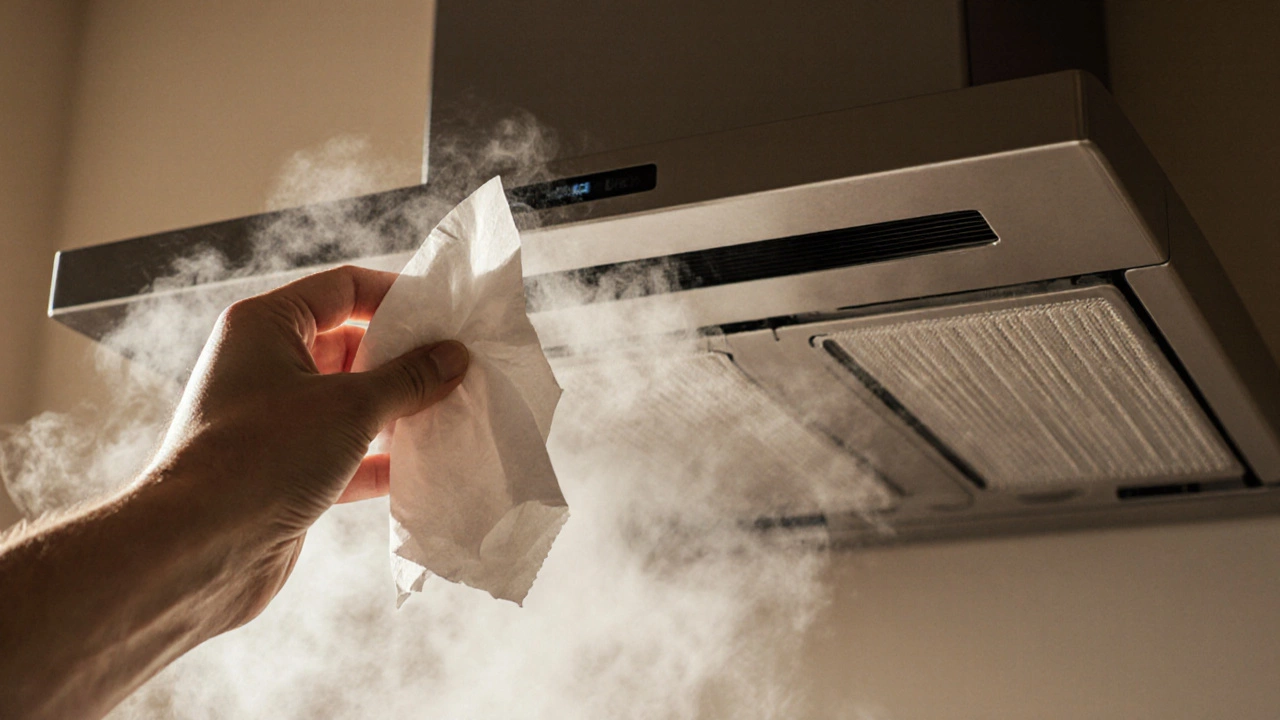Learn how to test if your extractor fan is working right - from checking airflow and ducts to spotting signs it needs replacing. No tools needed.
Extractor Fan Guide: Replacement, Repair, and Pro Tips
If your kitchen or bathroom smells like a sauna, the extractor fan is probably the culprit. A weak fan can leave moisture, grease, and odors hanging around, which may cause mold or damage walls. Before you call anyone, it helps to know the signs of a failing fan, how hard a DIY swap really is, and what to look for when hiring a professional.
When Should You Replace Your Extractor Fan?
Most fans last between 5 and 10 years, but several everyday factors can shorten that span. Listen for rattling or humming noises, feel for reduced airflow, and watch for persistent fog on mirrors. If you notice any of these, the motor or blades are likely worn out.
Another red flag is a burnt smell when you turn the fan on. That usually means the motor’s winding is overheating and the fan should be swapped out immediately. Ignoring it can lead to a total breakdown and a costly electrician call.
DIY Replacement: How Hard Is It?
Swapping a standard bathroom or kitchen fan is usually a medium DIY job. You’ll need a screwdriver, a drill (if the mounting screws are hard to reach), and possibly a voltage tester. First, turn off the power at the switchboard – safety first. Then remove the old unit, disconnect the wires (note which color goes where), and mount the new fan using the same brackets.
The tricky part is fitting the fan into tight ceiling or cabinet spaces. Some modern units come with flexible mounting plates that make alignment easier. If you’re comfortable handling wires and have a small ladder, most homeowners finish the job in under an hour.
However, if the wiring is hidden behind plaster or the vent duct needs rerouting, it’s smarter to call a qualified technician. Messing with concealed wiring can cause short circuits or violate building codes.
Choosing the Right Pro for Installation or Repair
When you decide to hire help, look for a service that specializes in ventilation. In Mumbai, many electricians also handle fan installations, but a dedicated extractor‑fan expert will know the best vent routing and noise‑reduction tricks.
Ask for a license number and a brief estimate before they start. A reputable pro will explain whether the issue is a motor failure, a clogged duct, or simply a worn blade. They should also offer a warranty on parts and labor – a sign they stand behind their work.
Finally, read reviews or get a recommendation from friends. A technician who responds quickly to emergencies (like a fan that stopped during a monsoon) can save you a lot of hassle.
Whether you decide to DIY or bring in a pro, keeping your extractor fan in top shape protects your home from moisture damage and keeps the air fresh. Regular cleaning of the grill and checking for loose screws can add a few extra years to your fan’s life, saving you time and money in the long run.
Wondering if you should toss your broken exhaust fan or give it another shot? This article breaks down the most common issues with extractor fans, shows when a repair is possible, and shares simple troubleshooting tips. Get practical advice for handling fan failures—from noisy motors to lost power. Find out what you can fix yourself and when it's time to call in a pro. Save money and avoid headaches by understanding your options when your fan stops working.
Extractor fans don’t last forever, and ignoring their problems could be costing you more than you think. This article breaks down why extractor fans wear out, signs your fan needs attention, and what you can do to keep it running longer. We’ll also dig into repair options versus replacement, so you can make a smart choice for your home. Whether you’ve got a bathroom fan on the fritz or a noisy kitchen extractor, you’ll find real tips that actually work. Learn how to spot trouble before it gets expensive.
Leaving the extractor fan on continuously can be a tricky decision. While it helps in controlling moisture and odors in your home, it also influences energy consumption. This article explores the advantages and disadvantages of keeping the fan on, common causes of repair issues, and tips for optimal fan usage without skyrocketing electric bills. Learn how to manage your home's air quality effectively while saving energy.
Servicing an extractor fan may seem daunting, but with a few simple steps, you can ensure it's operating efficiently. By learning how the fan works, gathering the right tools, and following a systematic cleaning and maintenance routine, you can prolong its lifespan and improve air quality in your home. Whether it's dealing with a noisy fan or replacing a filter, these insights make it manageable. Dive into tips that even beginners can use.
Extractor fans play a crucial role in maintaining a healthy and fresh environment in homes and commercial spaces. Knowing the right tradesperson to install or repair one can make all the difference. Electricians and HVAC specialists are typically equipped to handle this task, provided they have the necessary expertise and experience. This article explores who to call when your extractor fan needs attention and offers tips for ensuring a successful installation or repair.
Skipping the use of an extractor fan in your kitchen or bathroom could lead to a myriad of issues, from hazy mirror syndromes to mold infestations. This article delves into the unfolding consequences of neglecting this essential appliance. Learn about common air contaminants, the importance of moisture control, and tips on maintaining your fan effectively. Discover practical solutions to keep your home's air fresh and your surfaces steam-free. A deep dive into everyday home ventilation and why it matters.
An extractor fan is an important element in kitchen ventilation. This article explores the legal requirements for having an extractor fan in your kitchen, considering both health and safety regulations, as well as practical considerations. Learn about different types of extractor fans, their significance in maintaining indoor air quality, and tips for repair and maintenance. Discover how these appliances contribute to a safer and more pleasant cooking environment.
Extractor fans, vital in managing indoor air quality, generally offer a lifespan of around 10 to 15 years with proper care. Various factors like the fan's quality, usage frequency, and maintenance influence its longevity. Regular cleaning and timely repairs play a crucial role in extending the life of these essential household devices. This article explores the lifespan of extractor fans and provides helpful maintenance tips to keep them running effectively.








